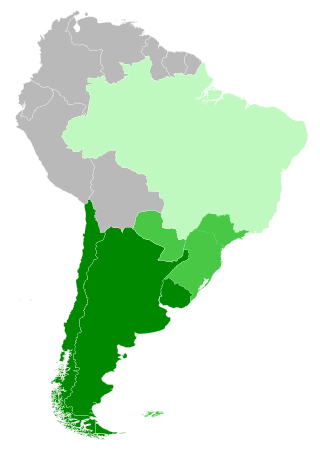Related Research Articles

The Southern Cone is a geographical and cultural subregion composed of the southernmost areas of South America, mostly south of the Tropic of Capricorn. Traditionally, it covers Argentina, Chile, and Uruguay, bounded on the west by the Pacific Ocean and on the east by the Atlantic Ocean. In terms of social, economic and political geography, the Southern Cone comprises Argentina, Chile, and Uruguay, and sometimes includes Brazil's four southernmost states. In its broadest definition, taking into account common history and geography, it also includes Paraguay, another Spanish-speaking country.

Immigration to Argentina began in several millennia BCE with the arrival of different populations from Asia to the Americas through Beringia, according to the most accepted theories, and were slowly populating the Americas. Upon arrival of the Spaniards, the native inhabitants of Argentine territory were approximately 300,000 people belonging to many Indigenous American civilizations, cultures, and tribes.

Argentina has a racially and ethnically diverse population. The territory of what today is Argentina was first inhabited by numerous indigenous peoples. The first white settlers came during the period of Spanish colonization, beginning in the 16th century. The Spaniards imported African slaves, who would go on to become the first Afro-Argentines. Following independence from Spain in the 19th century and well into the 20th century, numerous migration waves took place, with Argentina being the second most popular destination for migrants in the early 20th century, after the United States. Most of these migrants came from Europe.
Same-sex marriage has been legal in Uruguay since August 5, 2013. A bill for legalization was passed by the Chamber of Representatives on December 12, 2012, in a vote of 81–6. The Senate approved it with some minor amendments on April 2, 2013, in a 23–8 vote. The amended bill was approved by the Chamber of Representatives in a 71–21 vote on April 10 and was signed into law by President José Mujica on May 3, 2013. Uruguay became the third country in South America, after Argentina and Brazil, and the fourteenth worldwide to legalize same-sex marriage.

Immigration to Spain increased significantly in the beginning of the 21st century. In 1998, immigrants accounted for 1.6% of the population, and by 2009, that number had jumped to above 12% — one of the highest in Europe at the time. Until 2014, the numbers were decreasing due to the economic crisis, but since then, immigration to Spain has increased again since 2015, especially after 2021.

Italian Uruguayans are Uruguayan-born citizens who are fully or partially of Italian descent, whose ancestors were Italians who emigrated to Uruguay during the Italian diaspora, or Italian-born people in Uruguay. Outside of Italy, Uruguay has one of the highest percentages of Italians in the world. It is estimated that about 44% of the total population of Uruguay are of Italian descent, corresponding to about 1,500,000 people, while there were around 90,000 Italian citizens in Uruguay.

Paraguay and Uruguay established diplomatic relations on April 6, 1845. Paraguay has an embassy and a consulate-general in Montevideo. Uruguay has an embassy and a consulate-general in Asunción. Paraguay also has an honorary consulate in Punta del Este. Both countries were founding members of the Mercosur, and both are full members of the Rio Group, the Latin Union, the Association of Spanish Language Academies, the Organization of American States, the Organization of Ibero-American States, the Union of South American Nations, the URUPABOL, the Cairns Group and the Group of 77.

Uruguayans are people identified with the country of Uruguay, through citizenship or descent. Uruguay is home to people of different ethnic origins. As a result, many Uruguayans do not equate their nationality with ethnicity, but with citizenship and their allegiance to Uruguay. Colloquially, primarily among other Spanish-speaking Latin American nations, Uruguayans are also referred to as "orientals [as in Easterners]".
Chinese Uruguayans are Uruguayan citizens of Chinese ancestry or are Chinese people residing in Uruguay.
Peruvian Uruguayans are mostly Peruvian-born persons living in Uruguay. There are as well some Uruguayan-born persons of partially or full Peruvian descent.

Immigration to Uruguay began in several millennia BCE with the arrival of different populations from Asia to the Americas through Beringia, according to the most accepted theories, and were slowly populating the Americas. The most recent waves of immigrants started with the arrival of Spaniards in the 16th century, during the colonial period, to what was then known as the Banda Oriental.

A Uruguayan Argentine is an Argentine citizen of Uruguayan descent or a Uruguay-born person who resides in Argentina. As of 2012, there were over 116,000 Uruguayans living in Argentine territory.

Argentine Uruguayans are people born in Argentina who live in Uruguay. In 2010, there were over 10,000 Argentines living in Uruguayan territory.

Brazilian Uruguayans are people born in Brazil who live in Uruguay, or Uruguayan-born people of Brazilian descent.
Americans in Uruguay are mostly persons born in the United States and living in Uruguay. There are as well some Uruguayan-born persons of American descent.
Chilean Uruguayans are people born in Chile who live in Uruguay, or Uruguayan-born people of Chilean descent.
Cuban Uruguayans are people born in Cuba who live in Uruguay, or Uruguayan-born people of Cuban descent. As of 2019, there were 24,485 Cubans living in Uruguay.
Dominican Uruguayans are people born in the Dominican Republic who live in Uruguay, or Uruguayan-born people of Dominican descent.
Venezuelan Uruguayans are people born in Venezuela who live in Uruguay, or Uruguayan-born people of Venezuelan descent.

Federico Fagioli is an Argentine social activist and politician of the Patria Grande Front. Since 2023, he has been a member of the Senate of Buenos Aires Province, representing the Third Electoral Section. From 2019 to 2023, he was a National Deputy for Buenos Aires.
References
- ↑ "7,000 Bolivian tourists expected for 2015". Presidencia de la República. 4 December 2014. Archived from the original on 14 December 2014.(in Spanish)
- ↑ "Uruguay has 77,000 immigrants". Montevideo.comm. 17 June 2013.(in Spanish)
- ↑ "Just arrived". EL PAIS . Retrieved 24 July 2015.(in Spanish)
- ↑ "Immigration to Uruguay" (PDF). INE. Archived from the original (PDF) on 16 August 2013. Retrieved 6 March 2013.(in Spanish)
- ↑ "Foreign workers in Uruguay". EL PAIS. Archived from the original on 5 November 2013. Retrieved 4 November 2013.(in Spanish)
- ↑ "The calvary of Bolivian workers" . Retrieved 14 December 2014.(in Spanish)
